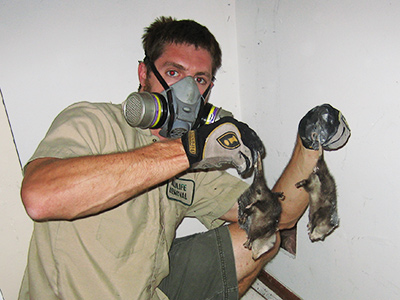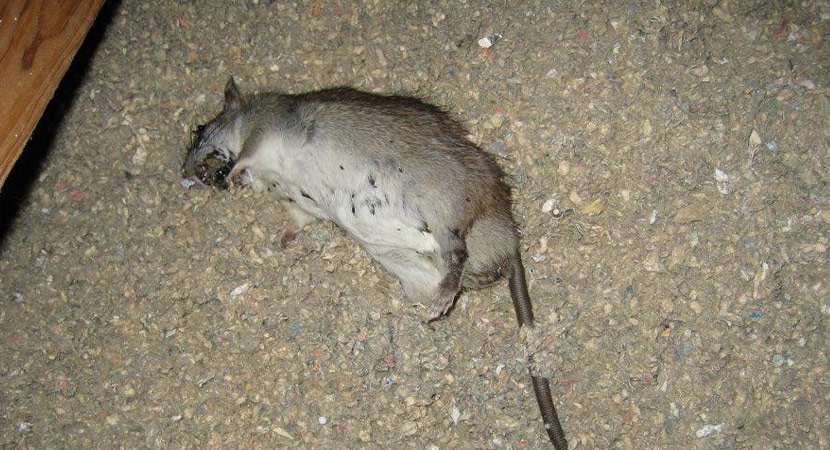Call me: 551-246-0586
Welcome to Jersey City Dead Animal Removal! Got a terrible smell in your house, or do you see a dead critter on your property? We are an animal control company specializing in the removal of dead animals from your home, attic, basement, walls, yard, or any part of your property. You clearly don't want a dead animal in your house. Carcasses attract flies and give off terrible smells, not to mention the potential diseases rotting flesh can cause. Whenever we remove dead animals, we use 100% safe methods and make sure to disinfect your home and get rid of all traces of odor. Click here for Free Roadkill Removal and click here for Dead Pet Body Removal. For deceased wild animals in your home or property, call us anytime at 551-246-0586 to schedule an appointment for today! We come out fast! Some of the services we offer include:
- Dead Animal Removal
- Foul Odor Diagnosis
- Full Property Inspections
- House Damage Repairs
- Dead Body Location Services
- Proper Carcass Disposal
- Cleanup & Decontamination Services
- Deodorization Services
CALL US ANYTIME AT 551-246-0586

Dead animals will often be carriers of disease and parasites, which makes handling carcasses a complicated matter. To survive, parasites will look for a new host, and you can become their next victim. The body fluids that the dead body will release can also cause skin irritation and infection. Moreover, you may be unknowingly breaking some regulations mandated by the state if you are improperly disposing of the animal. Luckily, you have us to take care of your problem. We have been providing dead animal removal services for more than a decade now. Different organizations have recognized us for our stellar performance. The locals have voted us as their #1 service provider for three years in a row. Nonetheless, we still feel like we are just starting. We believe that we have a long way to go to reach our goal. We hope that soon, we will be extending our serviceable areas that will include the nearby states. We want them to experience the same honest, quality, and friendly service that the local community enjoys. Do not hesitate to call us anytime: our operator will be on standby even during off-business hours. We are available 24/7, even during weekends and holidays. We understand how situations such as this need a timely solution.
What Prices Do We Charge?
Learn about dead animal removal costs - each situation is different!
What if you found roadkill or a dead animal such as a deer in a public place, and you want the city or Hudson County services to remove it for free? Click here for Free Hudson County Dead Animal Removal services. What if a farm animal like a horse, or your beloved pet dog or pet cat has died and you need the body taken away? Click here for Dead Pet Body Removal.
We are experts in dead animal removal, and take our job seriously. When removing dead animals, we do a COMPLETE job — not only do we remove the dead animal from your home or yard, we also decontaminate the area, deodorize it, and dispose of the animal or cremate it. If you aren't sure whether the stench in your house is due to a rotting carcass or another reason, we can sniff it out with our noses from our years of experience. We remove dead raccoons, dead opossums, dead skunks, dead squirrels, dead birds, even dead dogs and cats. We frequently remove dead rodents from inside walls, because poison kills rats and mice, who die in your house. We completely solve your dead animal problem by taking these steps:
- Sniff out the dead animal if it is somewhere in your home
- When necessary, for example if the animal is in a wall or under your house, cut a hole to remove the animal
- Remove the dead animal, safely and completely (and seal the hole if needed)
- Finish the job by decontaminating and deodorizing your home
- Properly dispose of the dead animal through incineration or other means
- Prevent it from happening again by finding out how they got in your house
Dead animal carcass removal is specialty work. Sometimes the job is simple, such as a dead opossum in the yard, in which case we can simply wear our gloves and respirator mask, bag the carcass, and take it away for incineration. Sometimes this is more complex, such as when the dead animal is under a home crawlspace, under a porch or deck or shed. Or if the animal is larger, such as a dog or a deer. The most complex cases are dead animals inside the house. The animal may have died inside the attic, or down in the walls, or the duct work, or any other part of the architecture. You may have a bad smell in your home, and you're not even sure what's causing it. We've removed not just dead animals, but rotting food, bad mold, etc. We specialize in locating the source of the smell, and we very commonly cut a hole in the ceiling or wall to remove the animal. We remove every bit of the carcass, mop up the juices, vacuum the maggots, spray it and wipe it down with disinfectant, cleaner, and we repair the hole we cut. In some cases we use ozone machines to neutralize odor.
Jersey City Dead Animal Tip: How long does it take for dead animal odor to go away?

When animals die in an area, they decompose and produce a horrible odor. This odor is typically the first indication that a dead animal carcass is in an area.
What dead animal odor causes
When animals decompose, they produce different chemicals including sulfur dioxide and hydrocarbons, resulting in a horrible odor. The smell could make an area uninhabitable, especially if the critter died indoors. The unpleasantness of the odor of dead animals is thus a top negative effect of the dead animal odor. Apart from the smell making an area uninhabitable, it could also trigger allergies and respiratory diseases. These are other direct negative effects of dead animal odor in an area. Nausea and headaches could also result from exposure to the odor of dead animals. The dead animal carcass can attract other predators and prey to an area. If the animal died indoors, the carcass could attract pests like flies, ants, and maggots. If the animal died outdoors, the carcass could attract scavenging predators. We should also mention that pets could bring dead animal carcasses into an area. When animals die indoors, especially in hidden spaces, costly repairs may be necessary to remove the carcass and restore the area to its original state or an improved state. Extensive repairs will particularly be necessary when fluids from the decomposing critters seep into surrounding areas. Fluids from the decomposing carcass could also seep into nearby water bodies when the carcass is outdoors. Carcasses could spread diseases. The infectious agents could come directly from the carcass or the pests attracted to the area. House flies attracted to an area by a carcass could spread diseases.
Factors influencing dead animal odor
The smell of carcasses is dependent on different factors, including those highlighted below:
Animal size
The bigger the animal, the higher the decomposing mass. Thus, larger carcasses from animals like possums and raccoons will cause stronger odors than smaller carcasses from animals like mice.
Carcass location
The location of the carcass influences the smell in that, if it is a poorly ventilated area, the odor will be more concentrated than if the area is well ventilated. This is because of the ineffective air circulation in poorly ventilated areas.
Temperature and humidity
Temperature and humidity affect dead animal odor because it influences the rate of decomposition of the carcass. Carcasses decompose faster in hot and humid climates. The higher the rate of decomposition, the stronger the dead animal odor.
Animal species
The carcasses of certain animals, like rats, produce a stronger odor than other critters.
State of decomposition
The odor of carcasses is strongest when they are being fully decomposed and have maggots. Before they begin to decompose and after the decomposition is completed, the odor is usually weak.
Airflow
The airflow works hand in hand with the location to influence the strength of the odor of carcasses. If the carcass is in the attic, for example, the odor will be strongest when the air moves downwards, like evenings and mornings, and weakest when it moves upwards.
How long does dead animal odor last?
As mentioned above, the length the odor lasts and strength of the dead animal odor depends on different factors. The smell can last for periods ranging from a few days to a few weeks. It is noteworthy that the removal of the carcass alone does not eliminate the odor. The carcass should be removed and the area cleaned of all associated materials, including fluids and the pests attracted to the area.
How to deodorize an area
After the removal of the carcass and associated materials, deodorization is also important for eliminating dead animal odor completely from an area. Deodorize an area after the removal of the carcass and associated materials using products that absorb smells. These products include common household products like vinegar and baking soda. Commercial products are also available for deodorizing areas after removing carcasses. The dead animal odor is one of the first indications of the presence of the carcass in an area. After the odor is noticed, the removal of the carcass and cleanup of the area is important for eliminating the odor. Deodorizing agents should also be applied to eliminate the odor.
We service nearby towns such as Jersey City, Bayonne, North Bergen, Hoboken, Union City, West New York, Secaucus, Kearny, Weehawken, Harrison, Guttenberg, East Newark,.